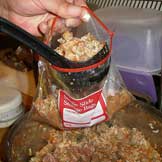Veterinarians often recommend owners feed dogs that have diarrhea a diet consisting of boiled hamburger and white rice for a few days. This type of bland, easily digested diet gives the intestinal tract a bit of a break while still providing needed calories and nutrients.
The recommendation is appropriate, so long as the dog doesn’t have any other worrisome symptoms such as vomiting, abdominal pain, or weakness, the caregivers understand that if the diarrhea doesn’t resolve quickly, the dog must be brought in for an exam, and the dog soon goes back to eating his normal diet.
Owners sometimes will treat their dog’s diarrhea with a homemade diet without first consulting a veterinarian, which is fine so long as they abide by the provisos mentioned above. However, I recently ran across a case report concerning a dog whose caregivers didn’t, and the outcome was almost disastrous.
An 11-week-old Saint Bernard was picked up from his breeder. His new owners realized he had diarrhea and started feeding him a hamburger and rice diet and dewormed him. His diarrhea resolved but returned whenever they tried to feed a commercially available, chicken-based adult dog food. Presumably being aware that hamburger and rice alone was not a nutritionally complete diet, the owners modified their offerings by adding apple, broccoli, egg (including shells), a vitamin and mineral supplement, and a small amount of the chicken-based adult dog food to the hamburger and rice.
The dog was seen several times by a veterinarian for routine care and appeared to be doing well, until he was evaluated at a veterinary teaching hospital for bilateral forelimb lameness presumably associated with osteochondritis dissecans of both shoulders. While there, the dog developed severe seizures; at one point his body temperature rose to a potentially life-threatening 108 degrees Fahrenheit. Lab work revealed many abnormalities, including a very low blood calcium level that was the cause of his seizures. The attending veterinarians were able to save him after giving him intravenous fluids, valium, propofol, and infusions of calcium gluconate, intubating him and putting him on inhalant anesthetics and oxygen, and performing cold water gastric lavage. The dog was hospitalized for three days.
An analysis of the dog’s homemade diet revealed that it was severely deficient in calcium, phosphorus, and vitamin D, all of which were provided at less than half the minimum levels required for growing dogs. Other deficiencies included sodium, chloride, iron, iodine, choline, copper, folic acid, vitamin A, linoleic acid, and taurine.
Once the dog’s condition was stable, he went home with oral calcium carbonate, calcitriol (a form of Vitamin D that helps the body make use of dietary calcium), taurine supplements, and a commercially available puppy food. A recheck of blood work approximately one month later revealed complete resolution of all abnormalities, and interestingly, the dog was also no longer lame.
I relate this tale not to scare you off from feeding dogs that have diarrhea a hamburger and rice diet, but to emphasize that such a nutritionally incomplete diet only be fed for a few days, and if the diarrhea doesn’t resolve, veterinary attention is essential. The long term feeding of a homemade diet should always be done under the supervision of a veterinary nutritionist.

Dr. Jennifer Coates
See Also:
Source
Hutchinson D, Freeman LM, McCarthy R, Anastasio J, Shaw SP, Sutherland-Smith J. Seizures and severe nutrient deficiencies in a puppy fed a homemade diet. J Am Vet Med Assoc. 2012 Aug 15;241(4):477-83.
Image: Hisom Silviu / via Shutterstock









